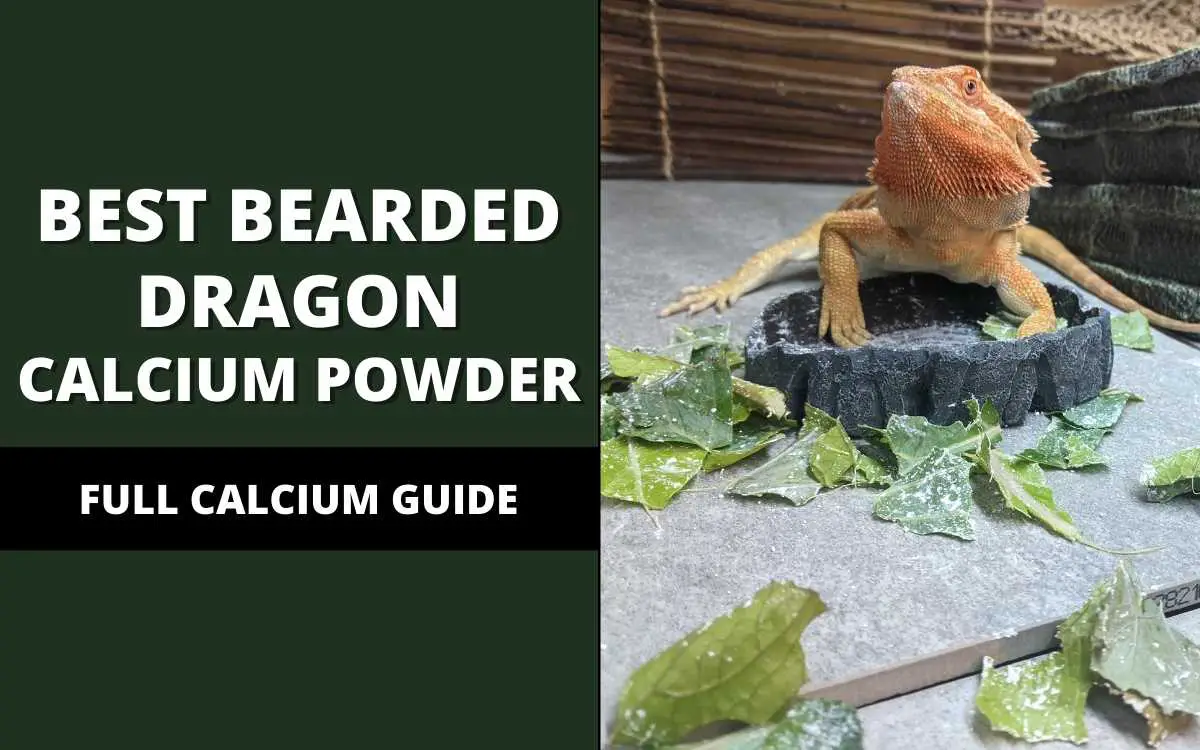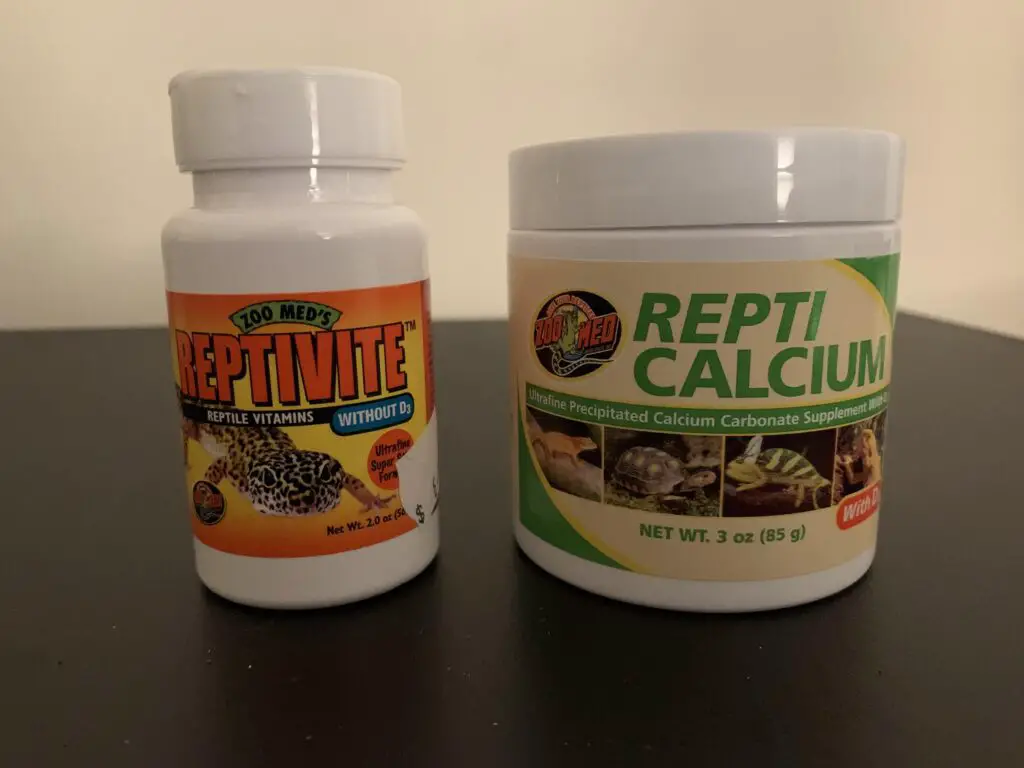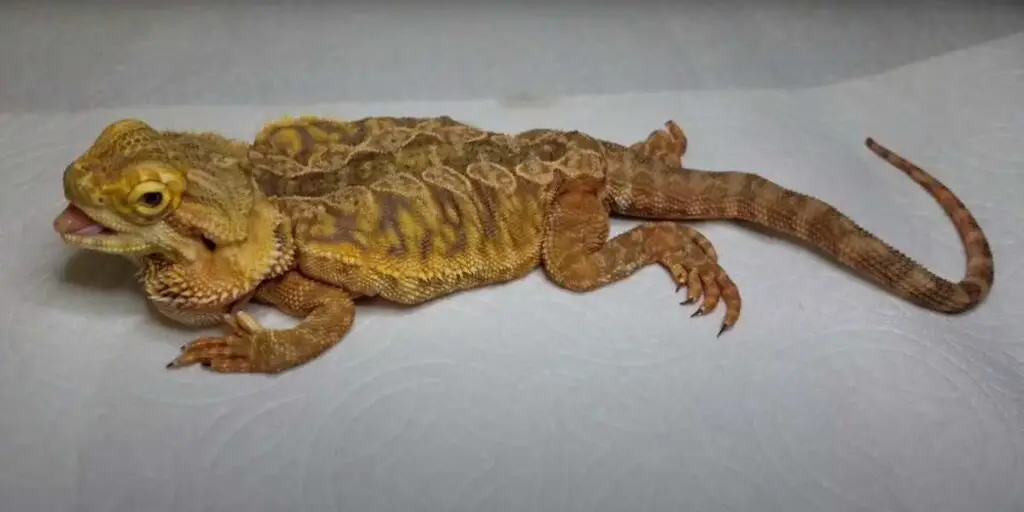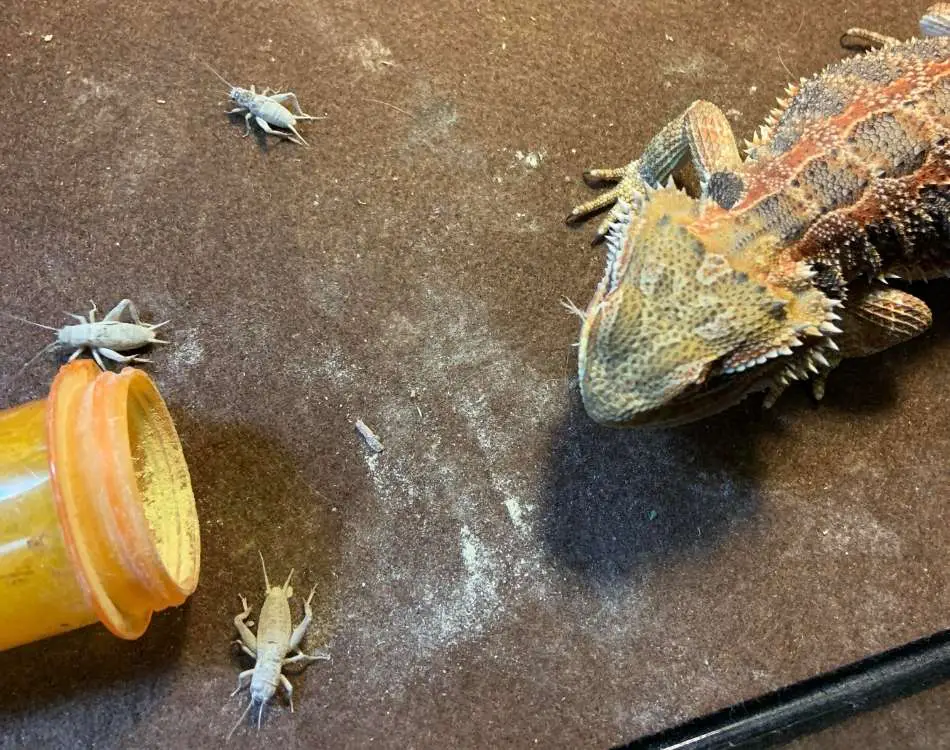Disclaimer: As an Amazon Associate I earn from qualifying purchases. Therefore, we may collect a share of sales from the links on this page, at no extra cost to you!

Best Bearded Dragon Calcium Powder
Bearded dragon calcium powder is an essential nutrient for all beardies – it’s that simple.
They need calcium to grow, develop properly, and support their bones and skeletal structure.
However, the complicated part is finding the best calcium powder for bearded dragons.
There’s a lot of products out there – and to be quite honest – not all of them are that great.
So, here’s our top pick, recommended by veterinarians:
Jump to..
Why Bearded Dragons Need Calcium

Bearded dragons need calcium (in the form of calcium powder) for a multitude of different reasons. First, and most importantly, calcium is what promotes bone growth in bearded dragons.
As a result, it is crucial that baby bearded dragons receive the proper amount of calcium in their diet in order to grow.
Additionally, female bearded dragons need calcium in order to form eggs properly. Calcium has a direct impact on a bearded dragons reproductive system and a lack of calcium may lead to infertility.
What Happens When Bearded Dragons Don't Get Enough Calcium

Although you may have the proper UVB/UVA bulbs in place, they are essentially useless if you’re not providing your bearded dragon with calcium powder.
If a bearded dragon doesn’t receive the proper amount of calcium it requires, your bearded dragon is at risk of serious illnesses and in some severe cases, death.
Basically, whenever your bearded dragons system is calcium deficient, it will be forced to extract calcium from its bones to use as its primary source of calcium.
As a result, calcium deficiency may lead to an array of issues such as twisted limbs, issues with the jaw, trouble walking, and an inability to eat and digest food. These are the symptoms of the terrible illness, Metabolic Bone Disease (MBD for short).
MBD is a potentially fatal disease that leaves bearded dragons with an altered skeletal structure. This can lead to limping, bowed legs, lumps across the body, tremors, weakness, lack of appetite, and a lack of moving.
MBD can be caused by a number of things including a lack of exposure to UVB/UVA lighting, but is most commonly caused by a calcium deficiency. Oftentimes, both play a role in the development of MBD in bearded dragons.
Learn More: Check out our in-depth article on bearded dragon care 101. You’ll be a beardie expert by the time you’re done reading it!
How to Feed Your Bearded Dragon Calcium Powder

Feeding your bearded dragon calcium powder is a relatively easy task.
The simplest, and most effective way of feeding your bearded dragon a calcium supplement, is by dusting it on their insects.
In case you’re worried that your bearded dragon won’t like the taste of the calcium on their food, don’t!
I’ve never heard of a bearded dragon refusing food because it was covered in calcium. To your beardie, food is food, and a little calcium dusted on their food doesn’t make a difference to them!
Pro Tip: You can also give your bearded dragon its calcium supplement by sprinkling the powder on their veggies!
Calcium and Vitamin D3: Is Vitamin D3 Necessary?
There’s a lot of controversy surrounding many calcium powder products because many of them contain vitamin D3. In recent years, it has been discovered that reptiles can actually overdose on this vitamin, especially if they’re consuming it on a daily basis.
However, despite this newfound knowledge, reptile companies are continuing to sell calcium powder that contains both calcium and D3. Of course, there are plenty that sell calcium without vitamin D3, but just as many are selling it with both calcium and vitamin D3.
Although this vitamin is admittedly a crucial nutrient in a bearded dragons diet, they already receive vitamin D3 naturally from their body which is then metabolized by the UVB light you should be providing your bearded dragon.
Therefore, any additional vitamin D3 may lead to a potential overdose, and you definitely don’t want that.
An overdose on vitamin D3 can result in various symptoms such as blocked glands, swollen glands, and difficulty breathing and eating. Serious symptoms may even result in hospitalization or even death.
Therefore, vitamin D3 is definitely not necessary and you will want to pick a calcium powder that doesn’t contain any added D3.
How Much Calcium Do Bearded Dragons Need?
Determining the amount of calcium your bearded dragon needs will largely depend on the age of your bearded dragon.
A baby bearded dragon will require a greater amount of calcium in their diet than an adult bearded dragon. This is because their bones and skeletal structure are still in the crucial stages of development.
Calcium for Baby Bearded Dragons
Like we mentioned in the previous section, since baby bearded dragons are still growing, it is essential they receive much more calcium in their diet than adult bearded dragons.
For baby bearded dragons, we recommend dusting your bearded dragons food with calcium around 4-5 times per week. This can include either insects or veggies.
Also, it’s important that you spread this number out throughout the week. Don’t just feed your bearded dragon dusted food five times in one day and think you’re good for the week. You need to be dusting their food once per day, on different days of the week.
Calcium for Adult Bearded Dragons
An adult bearded dragon needs much less calcium than a baby bearded dragon. This is because their bones are already fully developed. Instead, they need calcium to provide continuous support and strength to their bones.
So, how often should you give your bearded dragon calcium powder if it’s an adult?
We recommend giving your adult bearded dragon a calcium supplement three times per week. This can be in the form of dusting their crickets, worms, veggies, or multi-vitamin. It is considered best practice to distribute the calcium throughout the week, rather than giving it to them on three consecutive days.
Can You Put Calcium Powder in Water for Bearded Dragons?
Another commonly asked question is whether you can put calcium powder in water for bearded dragons.
Yes, you can put calcium powder in your bearded dragons water, but this generally isn’t advised as a sole source for providing your bearded dragon the proper calcium intake. Most bearded dragons rarely drink from a water dish and many reptile owners don’t even place one in their enclosure.
So, unless your bearded dragon is sick or unable to eat, it is best to rely on dusting your bearded dragons insects and veggies rather than putting calcium powder in their water.
In the case that they are sick or unable to eat, you can use a liquid multivitamin that contains calcium such as Mojetto Fluker Repta VIT Liquid.
Alternatively, you can use a product called Zilla Reptile Calcium Spray which is an easy-to-use product that you can spray on your bearded dragons food. However, in this case, you would administer it directly into your bearded dragons mouth. We’ll talk a bit more about this product later on!
What if my Bearded Dragon Doesn't Like Calcium Powder?
If your bearded dragon doesn’t like calcium powder and refuses to eat food containing a calcium supplement, it usually can be attributed to two common reasons.

You're Using too Much Calcium Powder
This is typically the most common explanation as to why bearded dragons don’t like calcium powder. You’re probably just putting too much calcium powder on their food.
Similar to humans, bearded dragons can be nit-picky with what they eat. Sometimes, too much calcium can turn them off. It’s not hard to imagine why as no one wants a mouth full of dust.
The obvious solution here is to lighten up on the amount of calcium dust you’re applying to your bearded dragons food.
They Don't Like the Food You're Giving Them
This is a much less common reason, but a possibility, nonetheless.
For instance, some bearded dragons like hornworms while others do not. If you’re applying calcium to your hornworms and giving it to your bearded dragon (which we don’t recommend, by the way; as hornworms should only be used as an occasional treat), and your bearded dragon does not like hornworms, it’s obviously not going to eat it.
If this is happening to you, try switching up the foods you’re applying your calcium powders to. So, if you’re currently putting it in their salad, try putting it on their insects. If you’re currently putting it on their insects, try putting it on their salads. You get the picture.
You're Not Distributing It Properly
If you’ve read this article, you should already have a decent understanding of how to give your bearded dragon their calcium supplement.
However, some new bearded dragon owners don’t understand the proper way of supplying their bearded dragon with their calcium supplement. As a result, people will oftentimes try put it on their lips or try to feed it to them directly. Alternatively, they’ll try to mix it in with their water dish and expect their bearded dragon to retain calcium this way.
These methods simply do not work, and should not be used on a healthy beardie. Like we mentioned earlier, beardie’s rarely drink from a water dish so they will not be able to retain the proper calcium intake from this method.
What if Nothing Works?
In the rare case that you can’t get your bearded dragon to eat food dusted in calcium powder, Mojetto Fluker Repta VIT Liquid may be your only option. This calcium supplement has a ton of nutrients and is a great source of calcium and for beardies.
Top 5 Best Bearded Dragon Calcium Supplements
So, now that we’ve covered everything there is to know about calcium powder and its proper administration, let’s dive into some of the best calcium supplements on the market.
When crafting this list, some of the key factors we considered are consistent with the following:
- Doesn’t contain vitamin D3
- Affordable
- Tried and tested among thousands of people
- From a trusted brand
1. Zoo Med Repti Calcium Without D3, 12-Ounce
Zoo Med Calcium is our number one pick when it comes to calcium rich powders. This product contains approximately 38-43% calcium per kg and contains absolutely no Vitamin D3.
Additionally, Zoo Med is a trusted brand that has consistently been the number one provider of reptile products and supplements in the world.
This product is phosphorus-free and only contains Precipitated Calcium Carbonate which is lead-free. Many products on the market contain Oyster Shell Calcium which can cause long-term damage to your bearded dragon.
You’ll be able to tell the difference between oyster shell phosphorous free calcium powders and calcium powders that are not because calcium powders with these impurities will be grey in coloration.
WHAT WE LIKE
-
Contains no Vitamin D3
-
Lead free
-
Free of impurities such as Oyster Shell Calcium
-
Zoo Med is a trusted brand operating for many years
-
Excellent reviews
-
Great value for the amount of calcium you're receiving
2. Zilla Reptile Health Supplies Calcium Supplement Food Spray, 8-Ounce
Zilla Reptile Spray is a great alternative for those that prefer not to dust their crickets or veggies. Or, perhaps your bearded dragon refuses to eat food dusted in calcium powder.
So, what is Zilla Reptile Spray and how does it differ from calcium powder?
Well, as the name implies, it is a liquid rather than a powder. This, as you can guess, makes administration a bit different than your standard calcium powder.
Rather than dusting your insects or salads, you’re going to spraying your salads. You simply spray it one time, let it dry for 15-seconds, and let your beardie dig in.
This calcium supplement is great and because it is a liquid, it seems to last forever. For bearded dragons that are calcium deficient, this is an excellent product since you can just add an additional spray or two.
Overall, people seem to give Zilla Reptile Calcium Supplement Spray excellent reviews and bearded dragons don’t seem to mind it all.
WHAT WE LIKE
-
Super easy to administer - simply spray it on your beardies salad
-
Dries quickly in only 15 seconds
-
Can be used to treat bearded dragons with calcium deficiency
-
Can be applied directly in your beardies mouth (if needed)
-
Lasts a very long time
-
Zilla is a trusted reptile company
3. Rep-Cal SRP00220 Phosphorous-Free Calcium Powder, 3.3-ounce
Rep-cal is another one of the best calcium supplements on the market and rightfully so.
The great thing about Rep-cal calcium powder is the fact that it is as pure as calcium can be! It is 100% natural as it is phosphorous-free oyster shell calcium carbonate.
Furthermore, it comes in a decent sized bottle of 3.3-ounces and it right in the price range of the other calcium supplements on our list.
Rep-cal also contains high levels of calcium according to the guaranteed analysis located on the bottle label – approximately 35-41%.
Finally, Rep-cal contains no added preservatives, artificial coloring, flavoring, or soy. You can feel 100% confident in this products ability to provide your beardie with one of the best calcium products out there!
WHAT WE LIKE
-
No vitamin D3
-
No artificial coloring, preservatives, sugar, etc.
-
High levels of calcium
-
Great for reptiles and amphibians
-
Wide bottle for easy scooping before feeding
-
Phosphorous-free supplement
4. Fluker's Reptile Calcium Supplement Without Vitamin D3, 4-ounce
Fluker’s is another popular reptile brand that has been around since the early days of captivating bearded dragons. I’ve personally used their products for many years, and they have never failed to impress me!
As with all our recommendations, Fluker’s Reptile Calcium does not contain any added vitamin D3. According to the bottle, the guaranteed analysis labels 3% moisture content (max), and 38% calcium content (minimum). The primary ingredient is natural limestone flour and is 100% phosphorus free.
Overall, there is not a huge difference in Fluker’s reptile calcium and Zoo Med’s calcium powders. Both of them are excellent calcium supplements which will help your beardie develop, digest food, and avoid Metabolic Bone Disease (MBD).
WHAT WE LIKE
-
Great value
-
Natural oyster shell phosphorous free calcium carbonate
-
Comes in different sizes
-
Fluker's has been operating since 1953
-
Wide bottle makes it easy to scoop-out calcium
-
Highly rated
5. Zoo Med Reptivite, without Vitamin D3, 2-Ounce
Zoo Med Reptivite is another excellent choice if you’re looking for an amazing calcium supplement that you can trust.
First and foremost, Reptivite comes without vitamin D3. Next, it doesn’t have any artificial additives or fillers such as sucrose, yeast, or soy.
The thing we like most about this calcium rich powder is the fact that it includes the complete amino acid complex. This is essential for your bearded dragon to digest protein properly.
Bearded dragons need calcium and Zoo Med’s Reptivite is one of the best products out there to get the job done!
WHAT WE LIKE
-
Inexpensive
-
No artificial additives or fillers
-
2:1 calcium to phosphorous ratio
-
Zoo Med is a reliable brand
-
Full Spectrum Amino Acid Complex
-
Great Reviews from Customers
Best Calcium Powder with Vitamin D3
So, we’ve talked about the best calcium supplements that do not contain vitamin D3. However, there are plenty of people that will still want to buy a calcium powder that also contains vitamin D3.
This will include people that don’t provide their bearded dragon with the proper UVB lighting (or haven’t in the past) or bearded dragons that are vitamin D3 deficient. Regardless, you should always check with a veterinarian before making any of these assumptions.
However, for those confident that your beardie needs additional D3 supplementation, the product we strongly recommend is Rep-Cal SRP00200 Phosphorous-Free Calcium.
This calcium is great for many reasons – including the fact the it is Oyster Shell phosphorus-free, it contains 35-40% calcium, and contains 400,000 IU/kg of vitamin D3.
Rep-cal SRP00200 is a great form of supplementation for growing reptiles and will be a great addition to your beardies diet.
In combination with the proper UVB lighting, your beardie will be back to full health in no time with this supplement.
Final Thoughts
As you’ve probably figured out, calcium supplementation is crucial for reptiles – especially those that are still growing!
Without a UVB light, proper exposure, and a good calcium supplement, your bearded dragon is at risk of developing Metabolic Bone Disease, problems with digestion, and deformities.
Wild bearded dragons don’t have these issues because they have exposure to the ultimate source of UVB and vitamin D3 – the sun.
However, as pet owners, it is our responsibility to provide the proper care so our pet can flourish – just as they would in the wild.
We hope you learned something new today! As always, Happy Herping!
